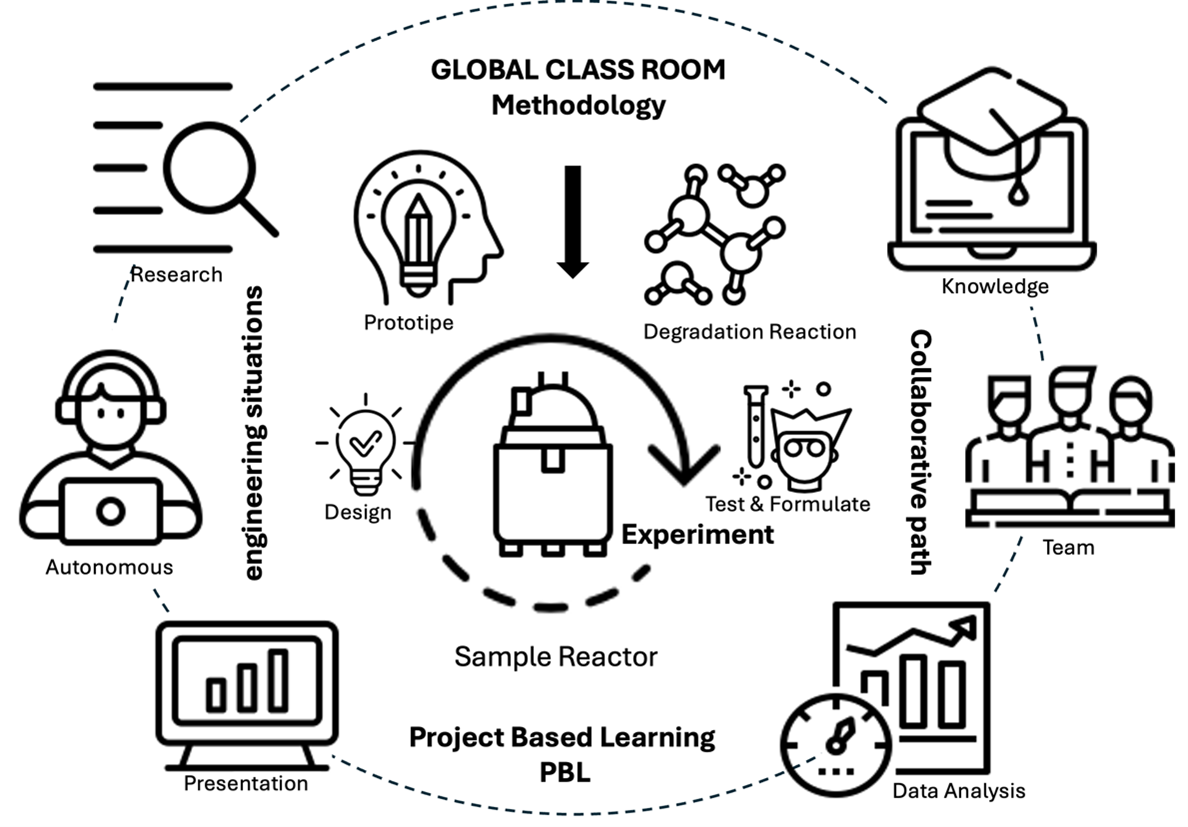Innovation in Education a Project Based Learning Implemented in Engineering using Global Classroom Methodology

Published 2024-08-12
Keywords
- Global Classroom,
- Online Project-Based Learning,
- Engineering,
- Educational Innovation,
- Prototype Design
How to Cite
Copyright (c) 2024 Jeffrey León, Irma Salgado-Escobar, Víctor Robledo-Rella, Leidy Lorena Piñeiro Cortes, Billy Crissien Castillo

This work is licensed under a Creative Commons Attribution-NoDerivatives 4.0 International License.
Abstract
Nowadays, strategies have been developed to enable online international and multicultural collaboration experiences. The Global Classroom (GC) project represents an advanced educational strategy that promotes international online collaboration. This experience brought together students of Biotechnology Engineering from the Tecnológico de Monterrey in Mexico with students of Chemical Engineering from the Universidad EAN in Colombia. These groups participated jointly in the Analytical Chemistry with Product and Process Design courses during the semesters from August to December 2020 and from February to June 2021, in two cohorts. At the heart of this collaboration was the implementation of online Project-Based Learning (PBL), designed to deepen students’ intercultural and technical educational experience. The core project involved an experimental study of the heat of reaction in the decomposition of hydrogen peroxide using an enzyme extracted from avocados at different stages of ripening. To evaluate the effectiveness of the GC program, three evaluation instruments were used: written reports, oral presentations, and anonymous surveys. The results of this assessment indicated a notable enrichment in several key competencies. Among them, teamwork stood out, where students learned to collaborate effectively despite cultural and location differences; problem-solving, encouraged by the challenging nature of the projects; and the exchange of ideas, which was enhanced by the diversity of perspectives and academic contexts. In addition, students showed an increase in the acquisition of new knowledge, successfully applied what they learned in previous scenarios, and optimized the use of computational and digital tools.
Downloads
References
- Wingfield M, Carson J, Mujulizi M, Von Lieres B, Adamovic M, Piper L, et al. International collaboration and connections through design thinking: A case study of the Global Classroom for Democracy Innovation (GCDI). Scholarship of Teaching and Learning in the South. 2024;8(1):1-18. https://doi.org/10.36615/sotls.v8i1.322
- Behari-Leak K. Toward a Borderless, Decolonized, Socially Just, and Inclusive Scholarship of Teaching and Learning. Teaching and Learning Inquiry. 2020;8(1):4-23. https://doi.org/10.20343/teachlearninqu.8.1.2
- Appiah-Kubi P, Annan E. A review of a collaborative online international learning. Int. j. eng. pedagogy. 2020;10(1):109-124. https://doi.org/10.3991/ijep.v10i1.11678
- Tecnológico de Monterrey. What is Global Classroom by Tec de Monterrey? [Internet]. Available: https://www.tecglobalclassroom.mx/. Accessed Jul. 22, 2024.
- Rubin J. Embedding Collaborative Online International Learning (COIL) at higher education institutions. Internationalization of Higher Education. 2017;2:27-44.
- Rulifson G, McClelland CJ, Battalora LA. Project-based learning as a vehicle for social responsibility and social justice in engineering education. In: ASEE Annual Conference and Exposition, Conference Proceedings, June, 2018. https://doi.org/10.18260/1-2--30902
- Molina-Carmona R, Arques-Corrales P, F Llorens-Largo. Four-Dimensional Learning, a Response to Social Responsibility in Learning. In Learning and Collaboration Technologies. Designing Learning Experiences: 6th International Conference. 2019;11590 LNCS:171–190. https://doi.org/10.1007/978-3-030-21814-0_14
- Brodeur DR. Mentoring young adults in the development of social responsibility. Australasian Journal of Engineering Education. 2013;19(1):13–25. https://doi.org/10.7158/22054952.2013.11464077
- Hartescu I. Providing technology support for project-based learning. The International Scientific Conference ELearning and Software for Education. 2014;3(1):223–229. https://doi.org/10.12753/2066-026X-21-175
- Salehudin M, Sarimin DS, Steven RH, Yunus M, Safiah I. Using instagram to support creative learning and project-based learning. International Journal of Advanced Science and Technology. 2020;29(5):11.
- Muhammad Y, Punaji S, Sugeng U, Dedi K. The influence of online project collaborative learning and achievement motivation on problem-solving ability. European J Ed Res. 2021;10(2):813-823. https://doi.org/10.12973/eu-jer.10.2.813
- Accreditation Board for Engineering and Technology. Accreditation Standards [Internet]. Baltimore: ABET. Available: https://www.abet.org/accreditation/. Accessed Jul. 22, 2024.
- United Nations. Sustainable Development Goals (SDGs) [Internert]. New York: United Nations. Available: https://www.un.org/sustainabledevelopment/. Accessed Jul. 22, 2024.
- García-García R, Contardo HI, Ruíz AM, Ramos TA, Tejada OV, Membrillo J. The Global Classroom experience, a didactic strategy to develop skills through Project-based learning. Lessons learned between Mexico and Chile in a multidisciplinary development on Food Science. Proceedings of the 20th LACCEI International Multi-Conference for Engineering Education and Technology: Education Research and Leadership in Post-Pandemic Engineering: Resilient Inclusive and Sustainable Actions. 2022:159. http://dx.doi.org/10.18687/LACCEI2022.1.1.159
- Munoz-Escalona P, de Crespo ZC, Marin MO, Dunn M. Collaborative online international learning: A way to develop students’ engineering capabilities and awareness to become global citizens. International journal of mechanical engineering education. 2022;50(1):89-104. https://doi.org/10.1177/0306419020934100
- Oakley G, Pegrum M, Lander B, Tomei J, Sonobe N, Deboer M. ‘Free rein’ to learn about language, culture & technology: a multimodal digital text exchange project between school students in Australia and Japan. Res. pract. technol. enhanc. learn. 2023;18:34. https://doi.org/10.58459/rptel.2023.18034
- Crescenzi-Lanna L, Contreras-Higuera W, Pieri V, Cataldi S. Promoting Gender Equality Through Cross-Disciplinary Collaborative Online International Learning Projects: The Students’ Perspective. European J Ed Res. 2024;13(4):1679-1691. https://doi.org/10.12973/eu-jer.13.4.1679
- Priego-Quesada JI, Germano AM, Schmidt D, Encarnación-Martínez A, Lemos AL, SendraPérez C, et al. Collaborative online international learning in physiology: a case study. Advances in Physiology Education. 2024;48(3):512-517.
- Mlodzianowska S, Olivos RM, Singh MP. International Collaboration Through Online Learning Between Students from Peru and India. Journal of Teaching in International Business. 2024;35(1–2):20–49. https://doi.org/10.1080/08975930.2024.2330022
